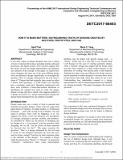How It Is Made Matters: Distinguishing Traits of Designs Created by Sketches, Prototypes, and CAD
Author(s)
Tsai, Geoff; Yang, Maria C.
Downloadv007t06a037-detc2017-68403.pdf (14.93Mb)
PUBLISHER_POLICY
Publisher Policy
Article is made available in accordance with the publisher's policy and may be subject to US copyright law. Please refer to the publisher's site for terms of use.
Terms of use
Metadata
Show full item recordAbstract
In the early stages of design, designers may use a variety of tools to represent their ideas, including sketches, physical prototypes, and digital models. Prior research suggests that the choice of tool and design representation can influence user opinions of the concept. In this paper, we explore how aware designers and users are of the ways different design tools can influence a design. Specifically, we investigate the question "How is a design influenced by the tool used to create it?" Designs that had originally been created as either a sketch, foam prototype, or CAD model were sketched into a consistent visual style. Designers experienced with these tools exhibited a better-Than-random likelihood of identifying the original tool used to create the design, despite viewing only the re-sketch. This suggests artifacts of a design tool persist in a design representation despite the design being translated from one medium to another.
Date issued
2017-08Department
Massachusetts Institute of Technology. Department of Mechanical Engineering; Massachusetts Institute of Technology. Institute for Data, Systems, and SocietyJournal
Volume 7: 29th International Conference on Design Theory and Methodology
Publisher
ASME International
Citation
Tsai, Geoff, and Maria C. Yang. “How It Is Made Matters: Distinguishing Traits of Designs Created by Sketches, Prototypes, and CAD.” Volume 7: 29th International Conference on Design Theory and Methodology (August 6, 2017).
Version: Final published version
ISBN
978-0-7918-5821-9